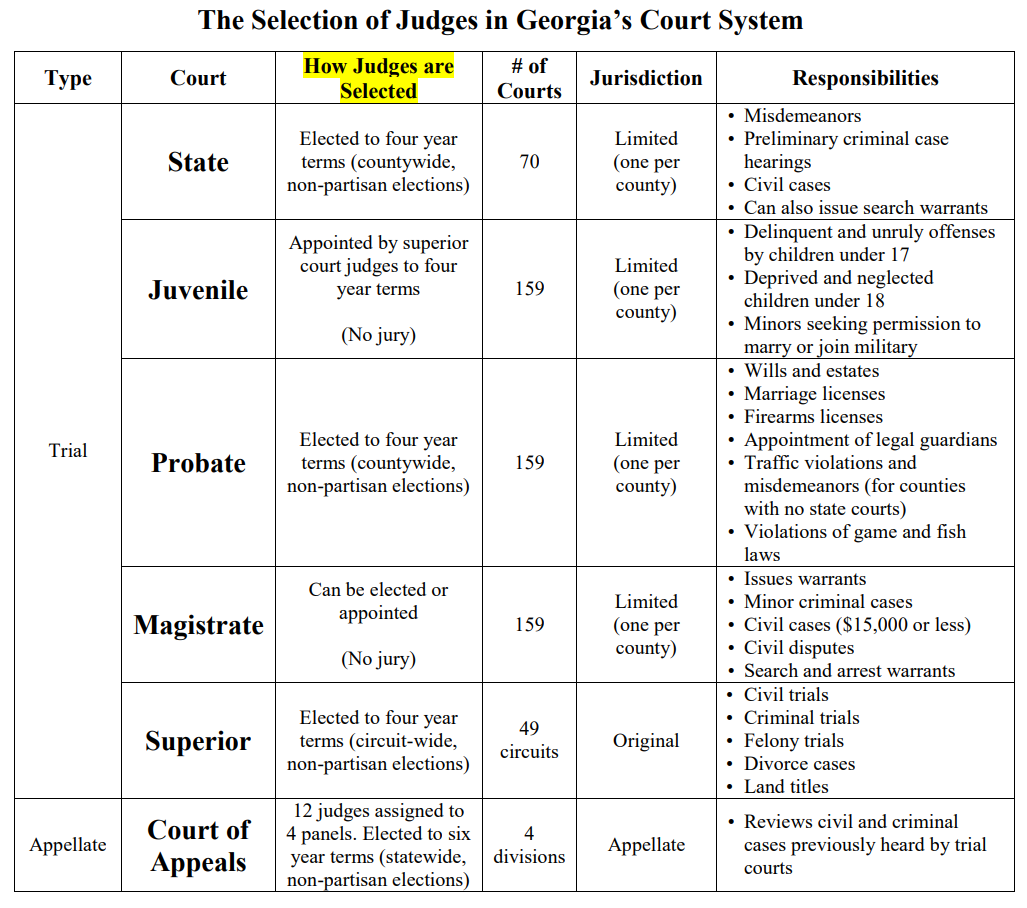GSESS8CG4 | GA's Judicial Branch
Analyze the role of the judicial branch in Georgia state government.
a. Describe the ways that judges are selected in Georgia.
b. Analyze the dual purpose of the judicial branch: to interpret the laws of Georgia and administer justice in our legal system.
c. Explain the difference between criminal law and civil law.
d. Explain the steps in the adult criminal justice system beginning with arrest.
b. Analyze the dual purpose of the judicial branch: to interpret the laws of Georgia and administer justice in our legal system.
c. Explain the difference between criminal law and civil law.
d. Explain the steps in the adult criminal justice system beginning with arrest.
- How are judges selected in Georgia?
- How does the judicial branch interpret laws?
- How does the judicial branch administer justice?
- What is the difference between criminal and civil law?
- What are the steps in the adult criminal justice system?
The Lessons
|
|
Video LessonsYouTube Playlist Lesson & Standard Lesson Reviews
|
|
|
VIDEOS IN THE LESSON
|
CG4.a - Ways Judges are Selected in GA
|
|
CG4. b - Dual Purpose of Judicial Branch
|
CG4.c - Differences Between Criminal Law & Civil Law
|
CG4.d - Steps in the Adult Criminal Justice System
The Story | GeorgiaStandards.org
GSESS8CG4.a
Teachers may choose to use the content concerning the number of courts, jurisdiction and responsibilities as information to supplement teaching this element. However, students are only responsible for describing the ways judges are selected in Georgia.
Teachers may choose to use the content concerning the number of courts, jurisdiction and responsibilities as information to supplement teaching this element. However, students are only responsible for describing the ways judges are selected in Georgia.
GSESS8CG4.b
The Georgia Supreme Court is the state’s highest court and holds certain powers that no other court in Georgia has. These include interpreting laws passed by the Georgia General Assembly, resolving challenges to elections results, and reviewing cases where the death penalty was sentenced. Unlike the U.S. Supreme Court, the seven justices on the State Supreme Court are elected to 6 year terms by Georgia voters (the justices on the U.S. Supreme Court are appointed by Presidents for life, retirement, or impeachment).
While all courts in the judicial branch play a part in ensuring justice in our legal system, the Supreme Court plays the most important role by interpreting laws enacted by the legislative branch. The Supreme Court accomplishes this by reviewing court cases that challenge the laws. If the Georgia Supreme Court rules that the law is unconstitutional (not supported by the Georgia or U.S. Constitution) then the law is struck down. Though the Georgia Supreme Court is the highest court in Georgia, any decision can be brought to the U.S. Supreme Court for appeal. The power to interpret laws is one of the checks that the judicial branch has over executive and legislative branches and is a way to protect against “bad” laws and ensure justice for all of Georgia’s citizens.
The state of Georgia administers justice by prosecuting many kinds of federal crimes, including terrorism, human trafficking, white collar and cybercrime, civil rights violations, identity theft, gang violence, child exploitation, and large-scale drug trafficking cases. The justice system aggressively investigates and prosecutes corruption by those in public office, government service, and corporate boardrooms. The system engages in prevention efforts to educate citizens about public safety threats, deter students and adults alike from turning to criminal conduct, and provide ex-offenders with an intensive re-entry program after they complete their sentences of imprisonment.
Justice is administered through the many levels of the state court system. The Georgia state court system has five classes of trial-level courts: the magistrate, , juvenile, state, and superior courts. In addition, there are approximately 350 municipal courts operating locally. There are two appellate-level courts: the Supreme Court and Court of Appeals.
GSESS8CG4.c
Criminal Law deals with laws that are created to protect society from wrong-doers. Crimes are serious offenses that are punishable with fines, community service, prison, and sometimes even death. The majority of citizens understand more about criminal law than civil law.
Civil Law deals with laws created to deal with relationships amongst individuals. Civil laws usually involve compensation from one individual or group to another individual or group based on injury or wrong doing. A civil wrong doing against an individual is called a tort.
A person can be charged with both criminal and civil wrong doing for the same action. For example, a person can be acquitted of murder in his/her criminal case and can also be found guilty of wrongful death and ordered to pay damages in his civil trial.
GSESS8CG4.d
The adult justice system is divided into civil and criminal law. In the case of criminal law, offenses are categorized into felonies and misdemeanors. Felonies are serious crimes such as arson, murder, rape and grand theft. The minimum sentence one can receive for committing a felony is no less than one year in jail. Felonies that can be punishable by death are called capital crimes. In Georgia, capital crimes include murder, kidnapping with bodily injury, aircraft hijacking, and treason. Misdemeanors are less serious crimes and are usually punished with less than a year in prison and a fine. Some misdemeanors are assault and battery, cruelty to animals, shop lifting, and trespassing.
For more serious crimes, defendants are given a trial by jury; for less serious crimes, defendants stand before a judge. Several courts hear civil and criminal court cases depending on their severity. However, the superior court hears all felony trials.
There are several steps in the criminal justice process. If an adult commits a serious enough crime, they can go through two processes. The first is the pretrial and the second, if needed, is the trial. Below are the steps for the pretrial process with a brief description of each.
Pretrial
Trial
If the suspect (now the defendant) pleads not guilty in the arraignment then their case will go to trial. Below are the steps of the trial process.
The Georgia Supreme Court is the state’s highest court and holds certain powers that no other court in Georgia has. These include interpreting laws passed by the Georgia General Assembly, resolving challenges to elections results, and reviewing cases where the death penalty was sentenced. Unlike the U.S. Supreme Court, the seven justices on the State Supreme Court are elected to 6 year terms by Georgia voters (the justices on the U.S. Supreme Court are appointed by Presidents for life, retirement, or impeachment).
While all courts in the judicial branch play a part in ensuring justice in our legal system, the Supreme Court plays the most important role by interpreting laws enacted by the legislative branch. The Supreme Court accomplishes this by reviewing court cases that challenge the laws. If the Georgia Supreme Court rules that the law is unconstitutional (not supported by the Georgia or U.S. Constitution) then the law is struck down. Though the Georgia Supreme Court is the highest court in Georgia, any decision can be brought to the U.S. Supreme Court for appeal. The power to interpret laws is one of the checks that the judicial branch has over executive and legislative branches and is a way to protect against “bad” laws and ensure justice for all of Georgia’s citizens.
The state of Georgia administers justice by prosecuting many kinds of federal crimes, including terrorism, human trafficking, white collar and cybercrime, civil rights violations, identity theft, gang violence, child exploitation, and large-scale drug trafficking cases. The justice system aggressively investigates and prosecutes corruption by those in public office, government service, and corporate boardrooms. The system engages in prevention efforts to educate citizens about public safety threats, deter students and adults alike from turning to criminal conduct, and provide ex-offenders with an intensive re-entry program after they complete their sentences of imprisonment.
Justice is administered through the many levels of the state court system. The Georgia state court system has five classes of trial-level courts: the magistrate, , juvenile, state, and superior courts. In addition, there are approximately 350 municipal courts operating locally. There are two appellate-level courts: the Supreme Court and Court of Appeals.
GSESS8CG4.c
Criminal Law deals with laws that are created to protect society from wrong-doers. Crimes are serious offenses that are punishable with fines, community service, prison, and sometimes even death. The majority of citizens understand more about criminal law than civil law.
Civil Law deals with laws created to deal with relationships amongst individuals. Civil laws usually involve compensation from one individual or group to another individual or group based on injury or wrong doing. A civil wrong doing against an individual is called a tort.
A person can be charged with both criminal and civil wrong doing for the same action. For example, a person can be acquitted of murder in his/her criminal case and can also be found guilty of wrongful death and ordered to pay damages in his civil trial.
GSESS8CG4.d
The adult justice system is divided into civil and criminal law. In the case of criminal law, offenses are categorized into felonies and misdemeanors. Felonies are serious crimes such as arson, murder, rape and grand theft. The minimum sentence one can receive for committing a felony is no less than one year in jail. Felonies that can be punishable by death are called capital crimes. In Georgia, capital crimes include murder, kidnapping with bodily injury, aircraft hijacking, and treason. Misdemeanors are less serious crimes and are usually punished with less than a year in prison and a fine. Some misdemeanors are assault and battery, cruelty to animals, shop lifting, and trespassing.
For more serious crimes, defendants are given a trial by jury; for less serious crimes, defendants stand before a judge. Several courts hear civil and criminal court cases depending on their severity. However, the superior court hears all felony trials.
There are several steps in the criminal justice process. If an adult commits a serious enough crime, they can go through two processes. The first is the pretrial and the second, if needed, is the trial. Below are the steps for the pretrial process with a brief description of each.
Pretrial
- Arrest - There is enough evidence that someone has committed a crime serious enough to warrant being taken in to custody (police detention).
- Booking - Law enforcement officers make an official arrest report and hold the suspect in the local jail.
- Initial appearance - The suspect (a person thought to be guilty of a crime) appears before a magistrate court where he or she goes before a judge to have the charges brought against them explained and to determine if they are to be released on bail (the temporary release of a prisoner in exchange for security given for the prisoner's appearance at a later hearing ).
- Preliminary hearing - The magistrate judge determines if there was a crime committed and if there is probable cause (a reasonable ground for supposing that a charge is well-founded) that the suspect was involved with the crime.
- Grand Jury indictment - A group of citizens, called a grand jury, examines the evidence in order to determine if the suspect should be charged with a crime. If they do decide there is enough evidence, they issue what is called an indictment (a formal charge of a serious crime).
- Arraignment- formal reading of the charges
- Assignment before Superior Court - Upon receiving an indictment, the suspect is brought before a superior court judge. If the suspect claims that they are not guilty, the case moves on to trial.
- Admitting Guilt/Plea Bargaining - The suspect also has the opportunity to plead guilty. If they plead guilty to the charge, the judge will sentence the individual and the case does not go to trial. The suspect also has the choice of plea bargaining and admitting guilt to a lesser offence. If the prosecutor agrees to the plea bargain, the suspect is sentenced for the lesser offense and the case will also not go to trial.
Trial
If the suspect (now the defendant) pleads not guilty in the arraignment then their case will go to trial. Below are the steps of the trial process.
- Selecting a Jury - In order to begin the trial, 12 citizens are selected as jurors for the case. In this process, the prosecuting and defending lawyers, along with the judge, can ask the potential jurors questions to determine if they should serve on the trial.
- Opening Statements - Once the trial begins, both attorneys are given the opportunity to speak directly to the jury to explain what they hope to prove in the case.
- Presentation of evidence - During the case, witnesses are called to the stand to give testimony. The process starts with the prosecuting attorney calling a witness who he or she hopes will prove the guilt of the defendant. The defendant’s attorney is given the opportunity to cross-examine the witnesses.
- Closing statements - After all of the witnesses have had a chance to speak, both attorneys present their final arguments in the case.
- Jury deliberation and verdict - After the final arguments, the jury is asked to discuss the case amongst themselves to determine if they think the defendant is guilty or not. Once the jury makes their decision, they notify the judge. If the verdict is not guilty, the defendant is released.
- Sentencing - If the jury finds the defendant guilty, the judge sentences the defendant, telling him/her the amount of time he/she will spend in prison and how much they owe in damages (if applicable).
- Appeal - If the defendant maintains his or her innocence or if there were mistakes made by the legal team or court in the case, the defendant can make an appeal where an appellate court will review the case. If they overturn the ruling, the case goes back to the superior court for a new trial.
Extra
Nothing yet. We shall see...



